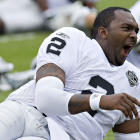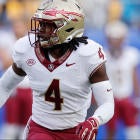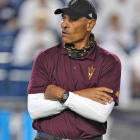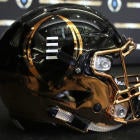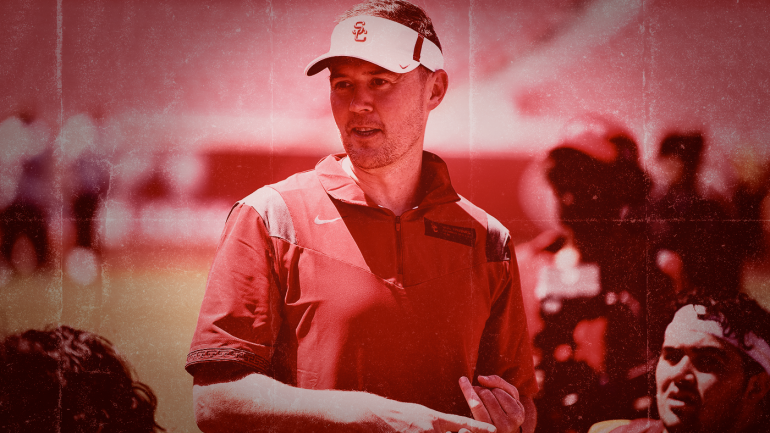
LOS ANGELES -- Lincoln Riley has heard them all. You know, the real reasons he supposedly bolted Oklahoma for USC so suddenly late last year.
The climb up the SEC hill was to too big for him with the Sooners transitioning from the Big 12. It's easier to win in a trending-downward Pac-12 than either the Big 12 or SEC.
"I heard the whole SEC narrative," Riley told CBS Sports. "To me, the SEC has nothing to do with it. It's all about the program that you're at and the position you think you can get to."
The Trojans' new coach then launched into his real reasons. Never mind that he is taking over a 4-8 program whose most recent national success is 15 years old.
To get to the top, you're going to have to beat everyone anyway, Riley says. Why not start on the ground floor and take on a new challenge filled with palm trees, sunshine and youth in your hip pocket while on a career path that still looks like an endless runway?
"I don't look at it like where I want to retire, trying to set up stability [at one place]," Riley said. "I'm 38. I want to experience different things. I want to win. This opportunity is so good, how can you not do it?"
Those words will no doubt grind teeth from Norman to the Oklahoma statehouse where Bob Stoops recently reminded legislators that no one is bigger than the Sooners.
Just a Program Guy. pic.twitter.com/23iUJsFnmp
— Eddie Radosevich (@Eddie_Rado) April 26, 2022
"Lincoln Riley didn't invent OU football," Stoops said.
No, he did not, but college football spun off its axis a bit when Riley chose -- at this point in his career -- to reinvent USC football.
Time for a change
Boiled down, Riley's words could be attached to any highly successful 38-year-old seeking upward mobility with a wife and two daughters who are his world. But applying that mindset to top-five coaching jobs creates complications.
A coach doesn't get to leave one superpower for another these days and call it a clean break. Brian Kelly dropped Notre Dame for LSU, but he had been in South Bend, Indiana, for 12 years. Kelly is 60, and the money was good. Ryan Day's next stop after Ohio State, if it ever comes, seems to be the NFL. He's 42.
Riley stepped away from a job where he went 55-10, won four Big 12 titles and advanced to three College Football Playoffs in five seasons. This after being elevated from offensive coordinator as the heir apparent to Stoops.
He stepped into the morass that is the transfer portal age, and for now, is whipping its ass. In a period of weeks, he flipped half the USC roster and now has people talking about the Trojans going from 4-8 to a Pac-12 championship.
It could just be that -- for the kid from Muleshoe, Texas -- this move is just what he claims, a new adventure.
"You always knew this place was special," Riley said.
No matter what bitter OU fans think of the blink-of-an-eye move following a brutal late-November loss to rival Oklahoma State, the man knows what it takes to get to the playoff. Counting his time as a coordinator, he has been to four of the eight CFPs.
During a wide-ranging interview with CBS Sports this week, Riley clearly believes USC at least an even chance to getting to that point.
"I've walked into four playoffs, and I've never had better than maybe the third-best roster [of the four teams]," Riley said. "Every other year, we were four of four. We had really good rosters, but they weren't the same. … I can't imagine that there could be a setting that we could build a better roster than we can here."
Yes, there will be more grinding of teeth in Oklahoma over that statement. But what is Riley supposed to say? The past is the past.
Expectations are steep
Hurt feeling aside, Oklahoma was never intended to be a steppingstone for Riley. An opportunity presented itself, and the coach is jazzed about selling a brand new culture.
Riley admits there is more to it than USC itself. As the Pac-12's flagship program, he knows the turnaround of the entire conference is expected to start with the Trojans.
This is a league that has been left behind in the CFP era. The Pac-12 has gone five years without a playoff berth and 17 without a national championship.
"If I was on a mountaintop, I would scream it," said USC defensive coordinator Alex Grinch, one of four key Oklahoma staff members who moved on with Riley. "These are pass-fail jobs. They just are. … These are jobs where you're expected to win championships."
That's why all this had to happen fast. 247Sports continues to have USC's transfer class ranked No. 1 in the country. That ranking was aided massively by additions of quarterback Caleb Williams (from OU) and wide receiver Jordan Addison (from Pittsburgh), respectively the No. 1 and No. 3 players in the portal. There were only eight high school signees, something Riley hopes doesn't happen again.
But the ends dictate the means. Texas coach Steve Sarkisian recently put the cutthroat nature of modern coaching in perspective.
"We've got to adapt to the times," said Sarkisian last month. "The old adage: You adapt or you die. There's no more dinosaurs on this Earth."
Rather, Riley was a child of the '90s, coming of age during that USC dynasty in the early 2000s. He was not unlike kids of previous generations who fell in love with USC through the television. For him, it wasn't in grainy black-and-white from the old Student Body Right days but high-definition screens.
"Reggie [Bush], Matt [Leinart], Coach [Pete] Carroll. … I remember turning on college football hearing Keith Jackson's voice, 'Here's the Coliseum,'" Riley said almost whimsically. "To a kid who didn't know anything about anything, it just looked different. You saw games all over the country … but there was something about this that was different. It felt different when you watched it. The energy behind it was different."
That might be the ground-floor reason Riley changed jobs. It's certainly why millions flock to Southern California -- to practice yoga on the beach, surf and chase opportunities in the entertainment industry.
For Riley, it was a longing for the West Coast that took hold.
"One of the big-picture visions is walking into that Coliseum and that place is packed and that energy is back to what I saw when I watched it on my TV at home," he said.
Rebuilding in more ways than one
Riley is jumping in, visor-first, knowing USC hasn't been this bad, record-wise, in 30 years. he said a key to the roster flip was being able to watch practice for a couple of days in December before the season-ending game with Cal.
"To watch the guys actually practice and work as opposed to studying tape, that kick-started the whole thing. That was huge," he said.
Grinch put it another way: "In some ways it was, 'Why is that guy standing on the sidelines? Why isn't he playing? Is he hurt?' You got a little bit of a sense of mindset of some of the guys. Commitment level of some of the guys."
The Athletic first reported USC took advantage of NCAA bylaw 15.5.1.7 that essentially allows first-year coaches to "cut" players and not have them count against the scholarship limit as long as those players were allowed to keep those scholarships as students.
Riley said he was previously aware of the little-known rule that went into effect 12 years ago but was revised in 2017.
"I didn't obviously intend on using it [at Oklahoma]," he said. But it was instrumental in restructuring the Trojans roster.
Both Riley and USC remain adamant that first contact between the parties came after that Bedlam game. If so, that means the remodeling of Trojans football was accomplished in weeks -- record time. That would be some sort of unofficial record making Riley this season's Mel Tucker if everything works out in Year 1.
The Michigan State coach dipped deep into the portal to turn the Spartans around from 2-5 in 2020 to 11-2 in 2021. Tucker was rewarded handsomely with a 10-year, $95 million contract.
Riley has reportedly become the highest-paid coach in the game at 10 years, $110 million. Because USC is a private institution, it is not compelled to release its employees' salary figures.
The school has obviously made a commitment. Riley wasn't too happy that a post appeared on the internet showing what was supposedly his new $17 million home in nearby Palos Verdes. Both coordinators live in that area, too.
That's been one of the criticisms of USC in the past: The cost of living is so exorbitant that assistants had to live far from campus to make it affordable.
The Riley hire certainly got the attention of the college football industry. Mike Bohn was named athletic director of the year. An administration criticized for being directionless -- and hanging onto former coach Clay Helton too long -- suddenly got back slaps.
"In a way, it was a kind of that unicorn in the forest," USC president Carol Folt said upon Riley's hiring. "We found that unicorn."
That makes Riley somewhat of the anti-Carroll, who was something of a fifth choice in 2000 before establishing USC's last run of excellence. The list of coaches that followed have mostly been former assistants (Sarkisian, Ed Orgeron, Lane Kiffin) who worked under Carroll. They knew the turf.
Riley is the gold standard. That first plane ride from Oklahoma to L.A. "was basically a 2 ½-hour personnel meeting," according to the coach. Riley poured over the roster, mug shots and player evaluations before touching down in Southern California.
📍 Los Angeles@LincolnRiley #FightOn✌️ pic.twitter.com/MKxN1FmlAP
— USC Football (@USC_FB) November 29, 2021
The roster remake was on.
"It's [transfers], obviously something I've used in my career," Riley said smiling. "It's worked out OK with a couple of those guys."
Please see the Heisman Trophy statues of Baker Mayfield and Kyler Murray at Oklahoma as reference points.
Riley's first USC quarterback, Williams, wasn't automatic. He and his family were reportedly upset at Riley's OU departure. It took until the late January deadline to enroll for Williams to finally decide on USC.
The Addison matter became bigger national news amid reports of tampering via name, image and likeness offers. One report suggested Pitt coach Pat Narduzzi accused Riley of tampering directly.
Riley was reminded that Addison also took visits to Texas and Alabama before landing at USC, sort of taking away the tampering chatter.
"Yeah, and the fact nobody tampered also does, too," Riley added, sarcastically.
If not for the transfer portal and the one-time transfer exemption, would an eye have been batted in the Addison hubbub? Take away those two factors, and it would make perfect sense for Addison to leave snow for surf, Northeast for West Coast, Pittsburgh for L.A. USC is a receiver factory; meanwhile, there certainly are a lot of factories in Pittsburgh.
Adding those modern factors only complicates the situation when Addison is the reigning Biletnikoff Award winner.
"It sends a message to future recruits," Riley contended. "Here's a guy who could have played football anywhere he wanted to after the year he hand. And he chose here."
And not primarily because of the long-rumored NIL riches.
"I don't know if I've ever had a more football-centered visit," Riley added.
Toughness is mandatory
Before anything happens, USC will have to get tougher on and off the field. Riley's Oklahoma used a metric to measure its talent production. Statistics showed, in the playoff era, the average national champion produces 15 combined NFL players across the following two drafts.
USC has seen a total of eight players selected in the last two drafts, four on defense. LSU's 2019 national championship team had 21 players selected in the two subsequent drafts. Georgia had 15 picked this year alone, setting a new record.
"That's hanging over our heads," Grinch said. "You can't ignore that."
That's one measure by which USC has to become relevant nationally again. In the three years before Grinch arrived as defensive coordinator, Oklahoma had a total of two defensive players drafted. In his three seasons at the helm (2019-21), the Sooners had 10 drafted. That tied for the most in a three-year period from 2010-12.
"When we've gotten it right, we've been a very good defense," Grinch said. "We got it wrong too much last year, and we were very average defensively. It makes me want to jump off of this [porch]."
Nothing happens at USC or in the Pac-12 until that defense improves. During those dynasty years, Leinart and Bush won Heismans, but the defense set the tone with its physical intimidation.
Perhaps that's what Pac-12 commissioner George Kliavkoff was thinking late last year when he called out the league for being deficient across the offensive and defensive lines.
"I don't think I was calling anyone out," Kliavkoff told CBS Sports. "You look at the skill positions, I put us up against anybody in the country there. I've been to enough of these games to observe some differences. It's a statistical fact that we are smaller on the lines than some of these conferences. That's an area for improvement."
More concerning, five-star talent has been leaking out from the West Coast to powers out East. Last year alone, four West Coast quarterbacks were highlighted in the Southeast and Midwest: C.J. Stroud at Ohio State, Bryce Young at Alabama, D.J. Uiagalelei at Clemson and Spencer Rattler at Oklahoma (now South Carolina).
"That's a huge concern," Kliavkoff said.
Maybe that was the look-in-the-mirror moment for the conference. It had already been noticed by Riley. A lot of the Pac-12 turnaround is on him and where USC goes from here.
"That's been the difference between this league and a lot of other leagues," Riley said. "What would Big 12 be in recent history if Oklahoma was down? What would ACC have been if Clemson would have been down? What would the Big Ten be right now if Ohio State had been down for the last 15 years? Insert any league in there. Take [Alabama] out of [the SEC], the last 15 years, what does it look like?"
Those leagues might look a lot like the Pac-12 where, in recent years, everyone in the league has at least two losses by Nov. 1, four weeks before Thanksgiving.
The new guy in town has the looks and the proper amount of wonder to fit in, but he isn't forgetting you, Oklahoma. Not by a long shot.
"It's not about winning press conferences," Riley said. "It's not about pregame speeches. Coach Stoops used to always use the line that Knute Rockne died a long time ago. All that rah-rah stuff is great, but it doesn't win football games."













